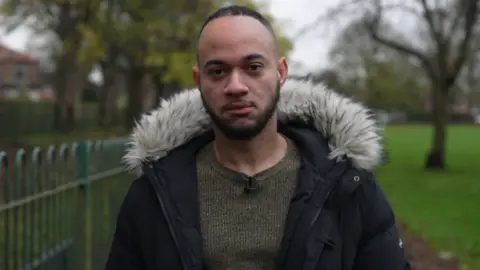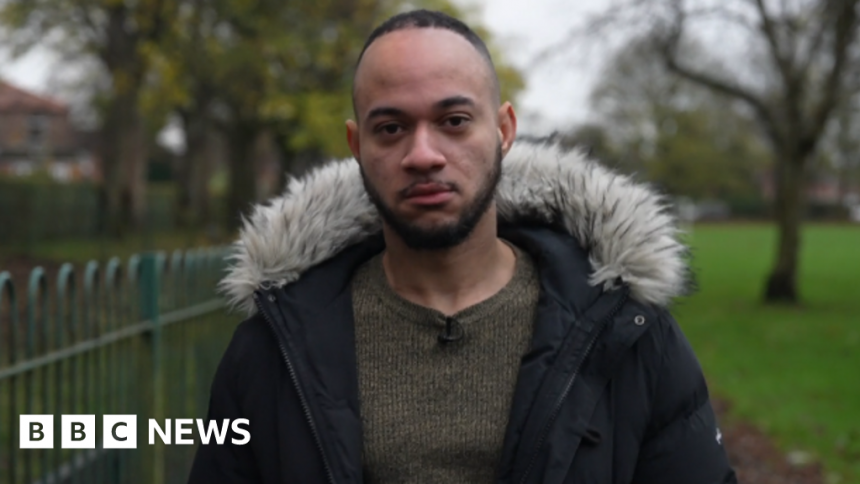‘I got quick cash in my account but it was too good to be true’
 BBC
BBCThe UK has seen a rise in “money mule” fraud, with people in their 20s most likely to be involved, new data seen by BBC Newsbeat suggests.
A money mule is someone whose bank account is used by criminals to transfer cash as part of a chain of transactions that makes it harder to track.
It’s a criminal offence, and more than 19,000 cases were recorded in the first half of 2024, according to UK fraud prevention group Cifas.
It said that’s an increase of 11% compared with the same period in 2023, and 21 to 30-year-olds were involved in almost half of all cases recorded from January to July.
‘I needed the money’
While some money mules are aware they’re doing something illegal, others aren’t.
They’re conned into taking part, either by people they trust or with promises of career progression and investment opportunities.
Derai, who lives in Manchester, says he hadn’t heard of money mules until he became one in 2019.
At the time, he was saving to pay a photographer for a portfolio to help him pursue a modelling career.
“I needed the money,” the 26-year-old tells BBC Newsbeat.
“I saw a friend post online, saying: ‘Do you want to make quick money today?'”
 Getty Images
Getty ImagesDerai says the friend’s Instagram account had pictures of “cars, hands holding £50 notes, holidays”.
“It was glitz and glamour,” he says. “She’d say: ‘I made this much money today and you can too’.”
Derai responded to a “quick cash” advert on Instagram and was put in touch with someone he now knows was a money mule recruiter.
After exchanging messages Derai shared his bank details and £4,000 ($5,000) was put into his account the same day.
“I wasn’t used to my bank balance being a four-digit number,” he says.
Derai says it seemed too good to be true. He would eventually find out that it was.
‘Doesn’t feel criminal’
In these cases money is moved into one account, withdrawn and sent onwards to another, typically leaving a small amount behind as payment.
Acting as a money mule can lead to up to 14 years in prison, and the National Crime Agency (NCA) says it has evidence linking cases to organised crimes including modern slavery and human trafficking.
Dr Nicola Harding, from fraud prevention service We Fight Fraud, says money mule recruiters are able to target people who wouldn’t usually commit a crime.
“If I went up to someone and said ‘go and mug that old lady’, they’d say ‘absolutely not, I’m not a criminal’,” Dr Nicola tells BBC Newsbeat.
“But if I said, ‘let me put that money in your account, you can take a little bit for helping me out,’ that doesn’t feel criminal.”
Dr Nicola believes recruiters “sell the dream” of money muling as a type of “side-hustle” and exploit the aspirations of people in their teens and 20s.
That dream was short-lived for Derai.
 We Fight Fraud
We Fight FraudHe met a recruiter at a bank, planning to withdraw the money deposited in his account and hand it back to them.
As he followed their instructions, the cash machine swallowed his card and his bank told him it had closed his account shortly afterwards.
While being a money mule can land you in prison, it’s more common for a red flag marker to be put against someone’s name if there’s suspicion of fraudulent activity.
“I was told I couldn’t have a bank account for up to six years,” Derai says.
“It’s a blacklist. You can’t get a credit card, a loan or a mortgage.
“I felt a bit ashamed. My mum was upset but said ‘son, you can fix it, do what you’ve got to do to take your life back’.”
Derai appealed to the Financial Ombudsman Service, an organisation that resolves disputes between businesses and customers.
Three appeals and 10 months later, he convinced officials to remove the marker against his name, allowing him to open an account and rebuild his future.
Beware ‘get rich quick schemes’
Derai’s story is one that’s becoming increasingly common in the UK.
Chris Ainsley, Santander UK’s head of fraud risk management, says many don’t address the situation until they notice the effect on their finances.
“We’ll try and get in touch with them to talk about what’s happened,” says Chris.
“But we often hear absolutely nothing until a few years later when someone realises we put red flags on their account.”
Santander tells BBC Newsbeat the bank saw more than 6,200 cases involving 25-34-year-olds in the 12 months up to September 2024 – a 45% increase on the year before.
In the same period it recorded more than 4,600 cases among 18-24-year-olds – a 26% rise.

Cifas told BBC Newsbeat it considered social media to be a “key enabler” for recruiting money mules, while the NCA says TikTok and Instagram are “very prevalent” in cases it’s investigating.
Instagram owner Meta said it worked with UK banks and investigators to tackle scams and stop criminal activity.
TikTok said that, in spring 2024, it removed 95.9% of videos violating its fraud and scam policies before they were reported.
Snapchat’s parent company Snap Inc. said it routinely saves suspected illegal content and makes it available to authorities upon request.
The NCA said its work led to 48 money mules being arrested in one month this autumn.
Nick Sharp, the deputy director of its National Economic Crime Centre, told BBC Newsbeat that cases were “increasingly” resulting in arrests.
“If you’ve been given an opportunity which says you can get rich quick, there is no legitimate job out there which allows that,” he says.
“No one will ever need access to your bank account so if that’s happening, report it.
“But even better, don’t go there in the first place.”
For more information and support, you can visit BBC Scam Safe.








